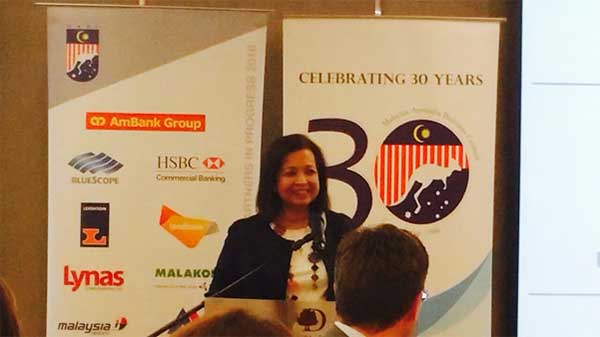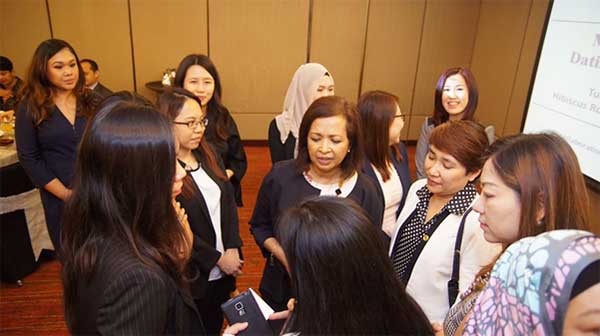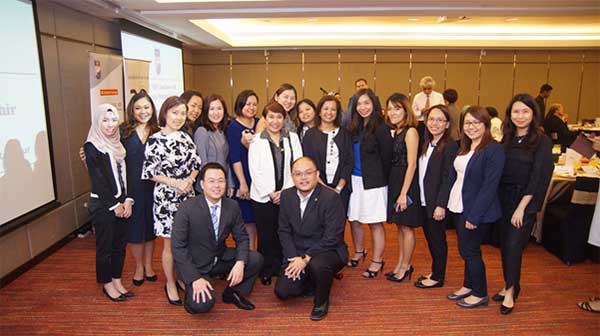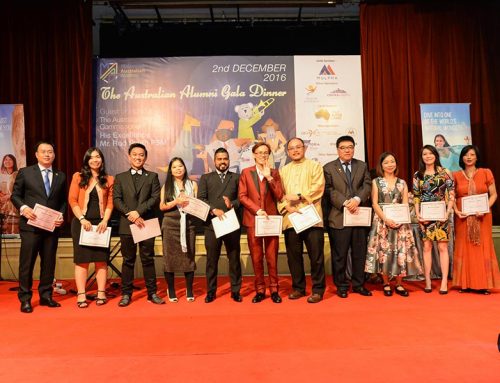Malaysia Australia Business Council VIP Luncheon with Datin Paduka Marina Mahathir
“When Women Complain, Are We Just Whining?” – this was the topic that Datin Paduka Marina Mahathir recently spoke on at the Malaysia Australia Business Council (MABC) VIP Luncheon. Around 80 people turned up to listen to Marina speak, the Malaysian Australian Alumni Council (MAAC) was also glad to be have been invited to participate in such a unique affair.
One will be surprised that a topic as such would probably garner a full audience of women, however it was not the case as many men were also present at the event to hear from Marina herself.
Mr Leigh Howard, Chairman of the MABC gave a very prominent introduction of Marina, illustrating her efforts and recognition throughout the years, an advocate for the various causes she believed in.
When Marina took the stage, she received a warm welcome from the audience and quoted two of her publications “Telling It Straight” and “Dancing on Thin Ice”, letting the audience know that she plans to conduct her session today in a very direct manner and threading on thin ice with certain topics of discussion.
Marina shared her experiences, expressing her views from her peers and other men, who constantly claim that in this present world, many people feel that women are at times ‘noisy’, constantly complaining about issues and fighting for women’s’ rights. She further quoted a recent uproar caused by Mr Kevin Roberts, Chairman of Saatchi and Saatchi, who made some sexist comments during his tenure, among other things, Roberts said that women do not become bosses because they prize work satisfaction over moving up and gender diversity is not a problem in advertising as it is way worse in financial services. Roberts further said that women at his firm are “happier” not taking on leadership roles, because ‘their ambition is not a vertical ambition’. Roberts has recently resigned from his post.
Discrimination at work, at courts, and in many other fields that we do not see, still exist at present day in this 21st century. However, undeniably, women have also come a long way and have obtained more rights than before – we now have the right to education, the right to vote (some countries), the right to drive (in some countries), but yet much are being taken for granted. Women now hold prominent positions in large organisations and even government bodies, if Hilary Clinton succeeds, she will also be the first woman president for the world’s most powerful country.
However, despite all these, women in prominent positions are still viewed as novelties. Speaking from her experience, Marina stressed on how trivial some people are in identifying prominent women. In her last experience of attending a global conference (global movement of moderates, where speakers whom are expert in their own fields were invited to speak) in Kuala Lumpur, she was surprised to see no women speakers at all. In the end she found out that the organisers did invite women speakers to attend however, the names were such as Queen Rania, Hilary Clinton and Tan Sri Zeti who were too busy to attend. Marina used this example to stress that we should think out of the box and cast our nets out further as there are women experts in various field besides the few famous ones whom we already know.
PEMANDU recently released a set of statistics, in universities, 70% of graduates are female, out of which 40% do not enter the workforce. And for the rest who enter into workforce, another 25% drop out within three years of employment. Main factor is due to women needing to achieve a work life balance. Women have to work, whilst after getting married look after the family and look after the children. Local government whilst worrying about this, try to enforce quota system of hiring a balanced number of female employees. However up till today, there is still no real studies as to why certain jobs still prefer males than females. These are all issues that we should look at. Whilst some women deter quota, Marina endorses the quota system, especially when climbing the corporate ladder, there ought to be more participation from female decision makers.
Sexual harassment is another issue faced by women at the work place and not many strict rules have been put in place in terms of law to protect women against sexual harassment and most initiative are mooted most by NGOs. Hence, quota inadvertently will push women up there and thereafter reassure women’s position holding a top post in a large MNC.
Violence against women, is another topic Marina touched on. In a study conducted and published in year 2012, this study looked at the state of women in several countries, and linked that to the level of overall violence in that specific country and how it behaves in its relation with other countries. The study found that: the larger the gender gap between the treatment of men and women in society, the more likely the country is going to be involve in intra and interstate conflict, to be the first to resort to force in such conflict, and to resort to higher levels of violence on issues of national health, economic growth, corruption and social welfare, the best predictors are also those that reflect the situation of women. What happens to women affects the security, stability, prosperity, corruption, health, regime type and power of the state.
The way women are treated in the country reflects on the general climate of the treatment of human right issues within the country, regardless of whether the country is democratic or otherwise.
In many countries, women are still being oppressed, child marriage is still ongoing. It is a long hard struggle to put in place proper laws to protect women’s rights. Marina ended her session asserting that Malaysian women are more blessed and luckier as we do have a bit more rights compared to countries like Pakistan, Afghanistan etc, but this does not mean we must forget what other women are going through in a less fortunate environment. On a personal note, gender bias is essentially evident in many areas of work in our current society and discrimination is still present at the workplace. What is sad is that women who have made it to the top holding senior position, also join the bandwagon to mistreat and discriminate another individual especially women who are holding a more junior post in an organisation.
Marina has indeed touched on many pertinent points on women’s rights and the current landscape and general perception of women in our society. Referring to the beginning of her presentation, she mentioned about her publications, which we believe it is time for some of us to head to the book store and pick up a copy to read more. Meantime we will just tune into the local newspapers to continue to read more about her thoughts and beliefs on women’s rights, and other contemporary issues faced by us.






